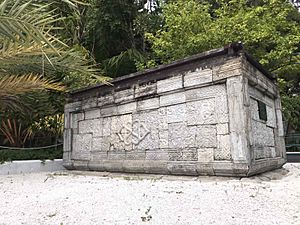Ibrahim Nasir facts for kids
Quick facts for kids
Ibrahim Nasir
KCMG, NGIV
|
|
|---|---|
|
އިބްރާހިމް ނާޞިރު
|
|
 |
|
| President of the Maldives | |
| In office 11 November 1968 – 11 November 1978 |
|
| Prime Minister | Ahmed Zaki (1972–1975) |
| Preceded by | Office created Maldives Sultanate (Muhammad Fareed Didi) |
| Succeeded by | Maumoon Abdul Gayoom |
| Personal details | |
| Born | 2 September 1926 Fuvahmulah, Maldives |
| Died | 22 November 2008 (aged 82) Singapore |
| Resting place | Near Malé Friday Mosque, Malé, Maldives |
| Spouses | Aishath Zubair (Tuttudon Goma) Maryam Saeed Didi Naseema Mohamed Kaleyfān |
| Children | Ahmed Nasir Ali Nasir Muhammad Nasir Aishath Nasir Ismail Nasir |
Ibrahim Nasir Rannabandeyri Kilegefan (Dhivehi: އިބްރާހިމް ނާޞިރު ރަންނަބަނޑޭރި ކިލޭގެފާނު) was an important Maldivian leader. He served as the prime minister from 1957 to 1968. Later, he became the President from 1968 to 1978. He is remembered for leading the Maldives to independence and for many modern changes in the country.
Contents
Early Life and Family
Ibrahim Nasir was born on 2 September 1926, in Fuvahmulah, Maldives. His father was Ahmad Didi from Male', and his mother was Aishath Didi from Fuvahmulah. Nasir came from royal families on both sides of his family.
Nasir was married three times and had five children. His first wife was Aisha Zubair, and they had a son named Ahmed. With his second wife, Mariyam Saeeda Didi, he had two sons, Ali and Mohamed. His third wife was Naseema Mohamed Kaleyfan, and they had a son, Ismail, and a daughter, Aishath.
Becoming a Leader
Ibrahim Nasir became the prime minister on 12 December 1957. He served under the ruler Muhammad Fareed Didi. He was also the minister of finance during this time.
From Prime Minister to President
On 11 November 1968, Ibrahim Nasir became the second President of the independent Republic of Maldives. He was the first president of the Second Republic. His time as president brought many changes to the country.
Key Achievements as President
Nasir is often called the independence hero of the Maldives. This is because the country gained full independence from the British Empire during his time as prime minister. He worked to modernize the Maldives in many ways.
Some of his major achievements include:
- Gaining full political independence for the Maldives on 26 July 1965.
- Starting modern education with English-based lessons in schools.
- Introducing A-level education in 1976.
- Bringing television and radio to the country. He started Television Maldives and Radio Maldives.
- Building the first airport in the Maldives, Hulhule airport, in April 1966.
- Starting the country's important tourism industry in March 1972.
- Modernizing the fishing industry. This included building the first motorized fishing boat in 1964.
- Opening the Felivaru fish canning factory in 1978.
- Creating Maldives Shipping Limited (MSL) in 1967. This company had over 40 ships that sailed around the world.
- Opening health centers in all atolls, starting in 1965.
- Opening the first modern hospital in October 1967.
- Allowing women to vote in Maldives in 1964.
When Nasir left office, the Maldives had no international debt. This showed how well he managed the country's money.
Language Changes
In 1976, Nasir introduced a Latin alphabet for the Maldivian language, called Malé Latin. This was done to help with new technologies like telex machines. However, many people did not like this change. The traditional Thaana script was brought back by the next president, Maumoon Abdul Gayoom, in 1978. Even so, Malé Latin is still used today for writing Maldivian words in English.
Later Years and Legacy
After his presidency, Ibrahim Nasir was followed by Maumoon Abdul Gayoom. Nasir left the Maldives and went to live in Singapore in December 1978.
Years later, in 1990, President Gayoom officially pardoned Nasir. This meant that any past accusations against him were cleared. Nasir remained in Singapore and did not return to the Maldives during his lifetime.
Death and Burial
Ibrahim Nasir passed away on 22 November 2008, in Singapore, at the age of 82. His body was brought back to the Maldives. On 23 November, his body was displayed at Theemuge, the presidential palace in Malé. Thousands of Maldivians came to pay their respects.
His funeral prayer was held on 24 November 2008. Ibrahim Nasir was laid to rest at dawn in the cemetery next to the Friday Mosque (Hukuru Miskkiy). He is survived by three of his children: Ahmed Nasir, Ismail Nasir, and Aishath Nasir.
See also
 In Spanish: Ibrahim Nasir para niños
In Spanish: Ibrahim Nasir para niños
 | Shirley Ann Jackson |
 | Garett Morgan |
 | J. Ernest Wilkins Jr. |
 | Elijah McCoy |


